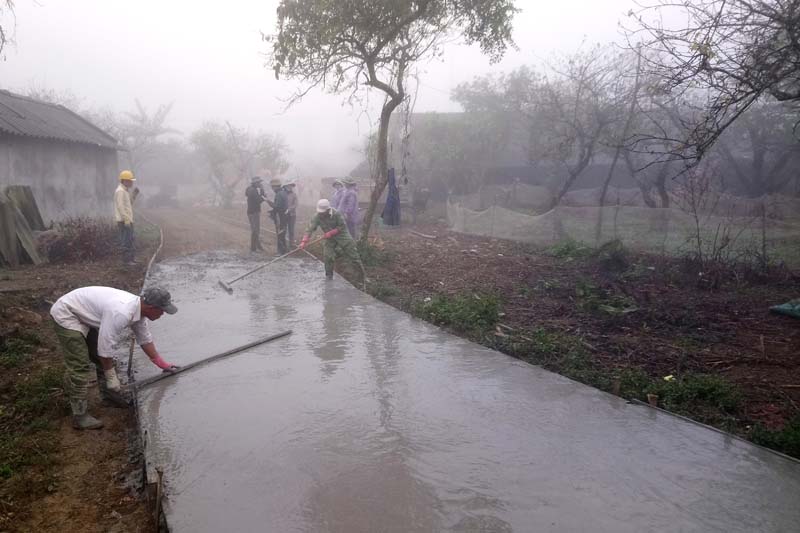
(HBO) – Every Saturday morning, Phang A Song and his wife join other residents in Pa Co Con hamlet of Pa Co commune, Mai Chau district, in cleaning up the local environment and dredging ditches along roads.
Residents in Pa Khom hamlet of Pa Co
commune, Mai Chau district, have actively taken part in the paving of rural
roads.
Chairman of the Pa Co communal People’s Committee
Sung A Mang said it is a disadvantaged commune, the life of many residents
remains unstable, while people’s educational level is still limited, posing
challenges to new-style rural area building efforts. Therefore, the commune has
faced numerous difficulties in mobilising people’s resources for infrastructure
construction.
Recently, residents in Pa Khom hamlet joined in
the concreting of over 500m of road and the construction of other facilities.
Aside from the State’s financial support, locals donated hundreds of square
metres of land, helped ready the construction site, and directly participated
in the building. As a result, in a short period of time, the road was completed
and put into use, helping to give a facelift to this rural area.
Thanks to the capitalisation of public support,
all 4.64km of roads linking hamlets across Pa Co commune have been paved, and
4.62km or 68 percent of the 7.62km of local roads cleaned up and protected from
flooding in the rainy season.
Residents have also actively joined hands in
building cultural facilities. The Sung, Trang and Mua families, among others,
have helped schools in Xa Linh I, Pa Hang Lon and Cha Day hamlets to upgrade
their infrastructure.
In 2018, people in Pa Co donated nearly 400sq.m.
of land to building school infrastructure. They include residents Trang A Pua
in Xa Linh hamlet (195sq.m. of land), Mua A Chenh in Cha Day hamlet (81sq.m.)
and Mua A Pua in Pa Hang Lon hamlet (110sq.m.). That has helped complete the
network of schools at different levels here./.
More than just an information technology teacher, Bui Van Nien is an inspiring figure who has nurtured the scientific curiosity and creative spirit of students in Vietnam’s ethnic minority communities.
Da Bac is the most disadvantaged mountainous district in Hoa Binh province, with ethnic minorities accounting for about 90% of its population. Over the past years, the district has mobilised resources to implement ethnic policies to improve the quality of life of local people.
In recent years, Hoa Binh province has consistently prioritised the protection, care, and education of children, particularly those from ethnic minorities and disadvantaged backgrounds, by creating a safe, healthy, and nurturing environment for their all-round development.
The Steering Committee for Tobacco Harm Prevention and Control of Hoa Binh province, in coordination with the Tobacco Harm Prevention and Control Fund, held a ceremony on May 28 in response to the World No Tobacco Day (May 31) and the National No Tobacco Week (from May 25 to 31). The event was chaired by Nguyen Van Toan, Standing Vice Chairman of the provincial People’s Committee and head of the Steering Committee.
Since 2021, the Center for Industrial Promotion and Industrial Development Consulting (CIIDC) under the Department of Industry and Trade has been implementing a school lighting model as part of the plan for using energy efficiently and economically in Hoa Binh Province in the pẻiod of 2021 - 2025. This model not only aims to improve the learning conditions and enhance the education quality, but it also promotes the message of energy saving, energy security, environmental protection and contributes to the goals of socio-economic development.
In the 2024 - 2025 school year, the entire Hoa Binh provincial education sector includes 520 educational institutions and schools. Among them are 13 ethnic boarding schools with 153 classes and 4,487 students. Four of these schools have met national standards, reaching 30.7 percent.



